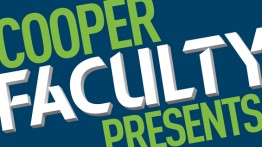Cooper Faculty Presents
Thursday, April 28, 2022, 6:30 - 7:30pm

Join us on Zoom for the Cooper Faculty Presents series to engage with a mix of scholars across disciplines as they share their research and pedagogy in new conversations that unite, inspire, and uplift.
On campus and around the world, The Cooper Union’s accomplished faculty are engaged in critical research, advancing knowledge, exploring complex issues, and solving global problems. Most critically, their teaching provides opportunities for a brighter future for the next generation, as they share their passion for scholarship, commitment to rigor, and desire to change the world with our students. At a time when the disciplines of The Cooper Union are so critical to rejuvenating our cities and our people, their voices are more important than ever.
Lydia Kallipoliti, assistant professor in the Irwin S. Chanin School of Architecture, will present a lecture titled Low Bubble Problems; An archeology of Infection of Environmental Control. This talk will examine pandemic space as both a scientific and ontological project and explore architectures of containment to find new ways to fathom legacies of interiorization, climatic control, the idealization of comfort, biocontrol and the fear of infection.
Click here to register for the lecture.




